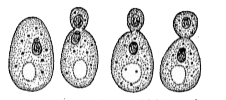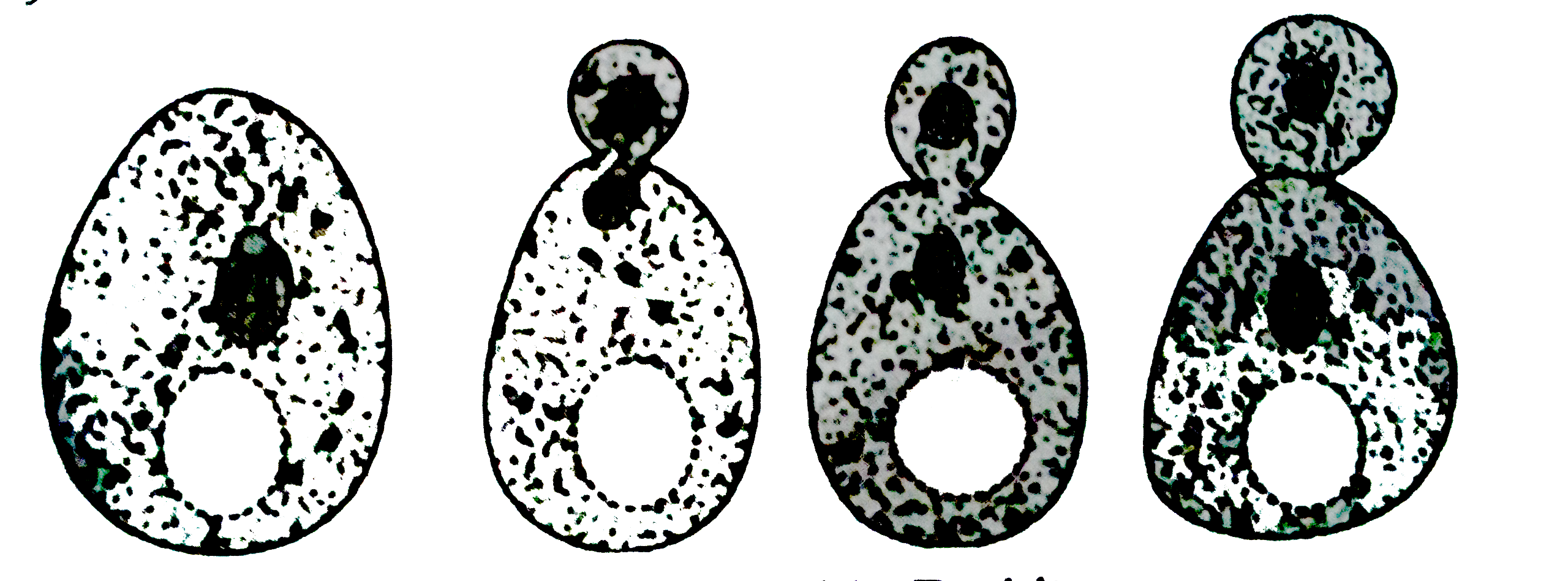Which type of reproduction requires single parent?
Sexual reproduction
Asexual reproduction
Both (a) and (b)
None of these
Step-by-Step Solution:
1. Understanding Reproduction Types:
- Reproduction can be broadly classified into two types: sexual reproduction and asexual reproduction.
2. Sexual Reproduction:
- In sexual reproduction, two parents are involved. This process requires the fusion of male and female gametes (sperm and egg).
- The fertilization of these gametes leads to the formation of a zygote, which develops into a new organism.
- Therefore, sexual reproduction cannot occur with a single parent.
3. Asexual Reproduction:
- Asexual reproduction, on the other hand, involves only one parent.
- This type of reproduction does not require gametes. Instead, it can occur through various methods such as:
- Fragmentation: The parent organism breaks into fragments, and each fragment can develop into a new individual.
- Budding: A new organism develops from a bud on the parent organism and eventually detaches to live independently.
4. Examples of Asexual Reproduction:
- In fragmentation, a parent cell divides to produce new cells, leading to multiple offspring.
- In budding, a part of the plant or organism detaches and can grow into a new individual when it finds suitable conditions.
5. Conclusion:
- Since asexual reproduction involves only one parent and allows for the production of offspring without the need for gametes, the correct answer to the question is that asexual reproduction requires a single parent.
Final Answer: Asexual Reproduction
---
- Reproduction can be broadly classified into two types: sexual reproduction and asexual reproduction.
- In sexual reproduction, two parents are involved. This process requires the fusion of male and female gametes (sperm and egg).
- The fertilization of these gametes leads to the formation of a zygote, which develops into a new organism.
- Therefore, sexual reproduction cannot occur with a single parent.
- Asexual reproduction, on the other hand, involves only one parent.
- This type of reproduction does not require gametes. Instead, it can occur through various methods such as:
- Fragmentation: The parent organism breaks into fragments, and each fragment can develop into a new individual.
- Budding: A new organism develops from a bud on the parent organism and eventually detaches to live independently.
- In fragmentation, a parent cell divides to produce new cells, leading to multiple offspring.
- In budding, a part of the plant or organism detaches and can grow into a new individual when it finds suitable conditions.
- Since asexual reproduction involves only one parent and allows for the production of offspring without the need for gametes, the correct answer to the question is that asexual reproduction requires a single parent.
Topper's Solved these Questions
- SEXUAL REPRODUCTION IN FLOWERING PLANTSBOOK - MODERN PUBLICATIONCHAPTER - SEXUAL REPRODUCTION IN FLOWERING PLANTSEXERCISE - Competition File (Assertion & Reasons Type Questions)
19 Videos
- SEXUAL REPRODUCTION IN FLOWERING PLANTSBOOK - MODERN PUBLICATIONCHAPTER - SEXUAL REPRODUCTION IN FLOWERING PLANTSEXERCISE - Revison Exercises (VI. Long Answer Type Questions)
25 Videos
- REPRODUCTIVE HEALTH BOOK - MODERN PUBLICATIONCHAPTER - REPRODUCTIVE HEALTH EXERCISE - CHAPTER PRACTICE TEST (SECTION D (LONG ANSWER QUESTION))
2 Videos
- STRATEGIES FOR ENHANCEMENT IN FOOD PRODUCTIONBOOK - MODERN PUBLICATIONCHAPTER - STRATEGIES FOR ENHANCEMENT IN FOOD PRODUCTIONEXERCISE - CHAPTER PRACTICE TEST
15 Videos
Similar Questions
Knowledge Check
Which type of reproduction occurs in hydra?
ABinary FissionBSpore FormationCBuddingDFragmentationWhich type of reproduction occurs in hydra?
A1. FragmentationB2. BuddingC3. Binary FissionD4. Spore FormationIdentify the incorrect statements
I. In budding the division is unequal
II. Binary fission is a mode of asexual reproduction found in both prokaryotes and Eukaryotes
III. The type of reproduction involving single parent is always asexual.
IV Meiosis is absent in haploid organismsAI,II, IVBII,IIICIII,IVDIII only
Types OF Reproduction
View SolutionWhich type of reproduction :
does not involve gametes?
View SolutionWhich type of reproduction is found in Hydra
View Solution
The above figure refers to which type of reproduction in yeast?
View SolutionThe given diagram refers to which type of reproduction in yeast

View Solution